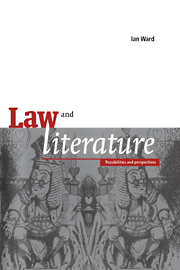3 - Cases in the laws of reading
Published online by Cambridge University Press: 29 September 2009
Summary
Is there a given meaning to a text? Or is there just a meaning generated by a particular reader? These related questions are obviously of paramount importance to any literary or legal enterprise. Moreover, in the particular context of this book they take on an especial relevance. Having suggested that certain texts are of particular importance to lawyers, our next task is to discuss the extent to which they have a meaning which can be shared by a readership. The question of interpretive (in)determinacy has emerged as one of the most pressing in contemporary legal studies, and we will shortly discuss some of the various suggestions that have been made. However, the parameters of this debate are set in literary theory, and are commonly determined by the polarity of two rival theories of interpretation, hermeneutics and deconstruction. A whole series of ‘debates’ among legal and literary scholars have oscillated around these coordinates, and it is these ‘cases’ which I want to look at in this chapter.
The first piece of litigation is the Gadamer–Derrida encounter. These two litigants are the leading advocates in contemporary hermeneutic and deconstructionist theory respectively. To a certain degree, both share a common philosophical origin in the later work of Martin Heidegger, and what has become familiar as his ‘linguistic turn’. By following Heidegger's lead, both Gadamer and Derrida deny the possibility of a transcendental language-free idea of human understanding.
- Type
- Chapter
- Information
- Law and LiteraturePossibilities and Perspectives, pp. 43 - 56Publisher: Cambridge University PressPrint publication year: 1995



